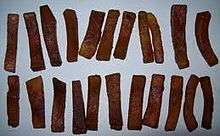Krupuk kulit
Krupuk kulit (Javanese: rambak or Minangkabau: karupuak jangek, lit:"skin crackers") is a traditional Indonesian cattle skin krupuk (cracker).[1] Traditionally it is made from the soft inner skin of cattle (cow or water buffalo), diced, and sun-dried until it hardens and loses most of its water content. The diced and dried skin are later fried in ample hot cooking oil until they expand in similar fashion with bubble and yield a crispy texture. This fried cattle skin is then sealed in vacuum plastic bags to ensure and prolong its crispiness.
Krupuk kulit | |
| Alternative names | Karupuak jangek (Minang), Rambak (Javanese) |
|---|---|
| Course | Snack and main course |
| Place of origin | Indonesia |
| Region or state | Nationwide |
| Serving temperature | Room temperature |
| Main ingredients | Cattle skin (cow or water buffalo), diced, sun dried, and fried in ample of coconut oil |
Serving

Krupuk kulit is often served as a crispy snack to accompany main meals. In Padang restaurants they are often offered as a side dish for nasi padang or sate padang, and often served with kuah gulai seasoning. In Java, krupuk kulit is the essential ingredients for krechek, a krupuk kulit dish in spicy coconut milk stew.
Variations
Most of krupuk kulit sold in Indonesia are made from cattle skin, ether cow or water buffalo (kerbau). However, in some areas with large non-Muslim populations such as Bali, Batak lands, and some Chinatowns in Medan and other cities, pork skin krupuk kulit is also available.[2] Compared to common cow skin crackers, kerupuk kulit babi or pork rinds has lighter colour and more easily crumble.[3] There is also a variant uses frog skin as krupuk kulit kodok.[4]

See also
- Chicharrón
- Pork rinds
- Prawn cracker, a food of similar texture and appearance made of prawn and starch
- Krupuk
Notes
- Abdul Lathief (May 14, 2012). "Kerupuk Rambak Potret Ekonomi Rakyat" (in Indonesian). Kompas.com. Retrieved May 17, 2014.
- Mariska Tracy (17 April 2016). "Aroy Mak Mak: Kerupuk Kulit Babi Homemade" (in Indonesian).
- "Membedakan Kerupuk Kulit Sapi, Kerbau, dan Babi". Sajian Sedap (in Indonesian).
- "Setahun 500 Ton Kodok Hijau Diekspor, Rp 72 Ribu per Kilo". JPNN.com (in Indonesian). 12 January 2015.